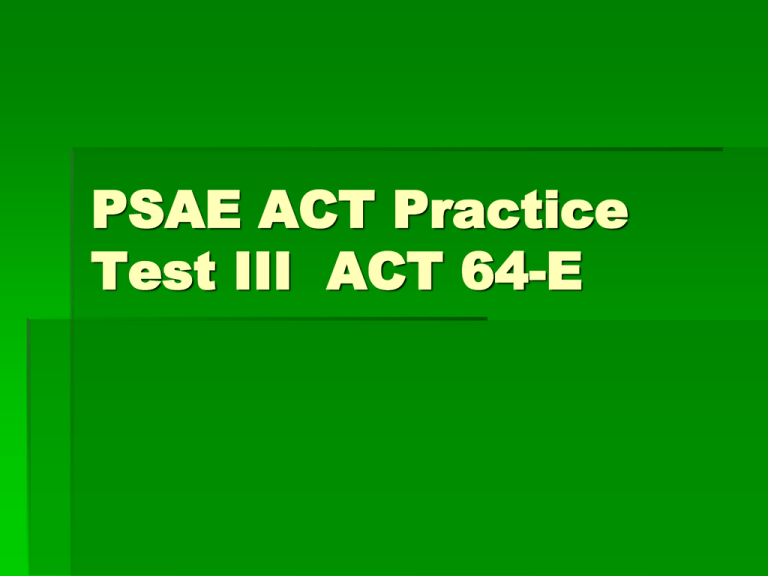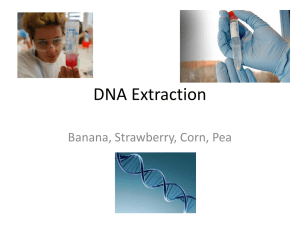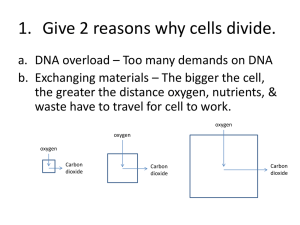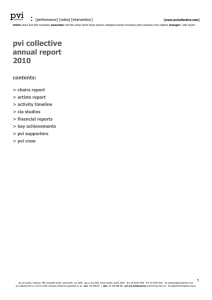PSAE ACT Practice Science Test
advertisement

PSAE ACT Practice Test III ACT 64-E P1 1 P1 2 P1 3 P1 4 P1 5 PII 6 PII 7 PII 8 PII 9 PII 10 PIII 11 or PIII 12 Trials 3 and 5 J PIII 13 Experiment 2 Flat-tasting beverage Roll time of the can of beverage increased. PIII 14 Again they set the can aside. Two hours later they found the roll time of the can before and immediately after shaking it (Trial 5). The results are shown in Table 2. Experiment 3 They shook the bottle, causing bubbles to form, and set the bottle aside. Fifteen minutes later, some bubbles were still visible, but after 2 hours, no bubbles could be seen. PIII 15 Suppose that in Experiment 2, two hours after the completion of Trial 5, the students had measured the roll time of the can of liquid without first shaking the can. Based on the results of Trials 4 and 5, the roll time would most likely have been: less than 1.86 sec. PIII 16 Based on the results of Trials 3-5 and Experiment 3, if the students had added 1L of the flat-tasting beverage to one of the empty aluminum cans, sealed the can, and shaken it, how long would it most likely have taken for the number of bubbles in the beverage to become too few to affect the roll time? Between 15 min and 2 hr PIV 17 PIV 18 Where does photosynthesis take place? Chloroplasts PIV 19 400 nm 430 nm 670 nm 630 nm 700 nm PIV 20 6 C O2 + 12 H2O + energy C6H12O6 + 6 O2 + 6 H2O Glucose PIV 21 PV 22 In Experiment 1, the density of ethanol was found to be: PV 23 Based on the results of Experiments 13, the density of PA-11 is most likely: between 0.999g/mL and 1.05 g/mL PV 24 67.54 1.35 PV 25 This question needs to be addressed. PV 26 In Experiments 1 and 2, the students tared the graduated cylinder in each trial so they could more easily determine: F. The mass of the substances added to the graduated cylinder. PV 27 A student claimed that polycarbonate is more dense than PA-6. Do the results of Experiments 1-3 support his claim? B. Yes, because in Liquid 8, polycarbonate stayed at the bottom and PA-6 rose. PVI 28 In Experiment 1, which of the bacterial species fermented lactose? PVI 29 In Experiment 2, Synergism occurs when 2 bacterial species act together to ferment a sugar. Suppose that in Experiment 2 both Species B and Species C had been added to a large test tube containing lactose broth. Which of the following would most likely depict the results? PVI 30 PVI 31 What is the evidence from Experiments 1 and 2 that Species C and D acted synergistically in Experiment 2? PVI 32 PVI 33 Is the hypothesis that Species A and Species C acted synergistically supported by the results of Experiment 2? No, because neither acid nor CO2 was produced from lactose.. PVII 34 Which of the following statements is most consistent with the DNA Hypothesis? The amount of DNA will generally increase from cell type to cell type as the number of: H. Chromosomes in the nucleus increase from cell type to cell type. PVII 35 By referring to the observation that DNA is found exclusively in the nucleus while proteins are found throughout the cell, the scientists supporting the DNA Hypothesis implies that genes are made only of DNA because which of the following are also found only in the nucleus? D. Chromosomes PVII 36 According to the passage, a similarity between DNA and proteins is that both types of molecules: J. Are composed of smaller subunits PVII 37 According to the Protein Hypothesis, which of the following observations provides the strongest evidence that genes are NOT composed of DNA? A. DNA is composed of only 4 types of nucleotides. PVII 38 Mitochondria are organelles located in the cytoplasm that are responsible for energy transformation in a cell. After the 1940s, it was observed that mitochondria contain their own genes. This observation contradicts evidence stated in which hypothesis? F. The DNA Hypothesis, because if genes are made of DNA, the observation would show that DNA is present outside the nucleus. PVII 39 The scientist who describes the DNA Hypothesis implies that the Protein Hypothesis is weakened by which of the following observations? B. For a given organism, the amount of protein in different types of cells is not the same. PVII 40








